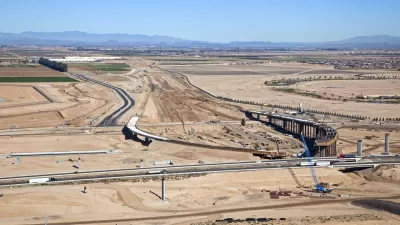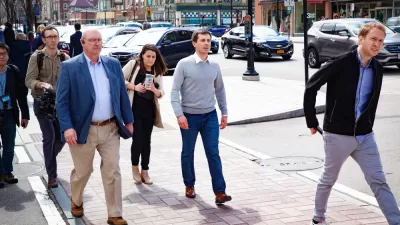Transportation is the biggest contributor to greenhouse gas emissions in the U.S, making President-elect Biden’s choice for Transportation Secretary—and the department’s policies on emissions, electric vehicles, and autonomous vehicles—critical.

The transportation sector is the biggest contributor to greenhouse gas emissions in the United States. As President-elect Biden lays the groundwork for a new administration and prepares to re-enter the Paris Agreement, his cabinet pick for secretary of Transportation, along with his policies on emissions, electric vehicles, and autonomous vehicles will determine the fate of Biden’s ability to hit greenhouse gas (GHG) targets set by the 2016 Paris Agreement.
You can’t possibly take climate change seriously without deep reflection on how our transportation system works. Transportation accounts for almost 30% of all greenhouse gas emissions in the United States, more than any other sector, including agriculture, industry, and even electricity generation.
Which is why Biden’s choice for Transportation Secretary, and the department’s policies on emissions, electric vehicles, and autonomous vehicles is so consequential in the fight to hit critical Paris Agreement goals.
Though counterintuitive, keeping Elaine Chao in the role, Trump’s secretary of Transportation, has its upsides. Chao is married to Senator Mitch McConnell, who is likely to remain Senate Majority Leader. Not only could Chao’s pillow talk act as a bridge across party lines, but the move could also help Biden get a deal on another cabinet post.
Politico has compiled their list of contenders for the top transportation job, with Los Angeles Mayor Eric Garcetti leading the pack. A long-time Biden loyalist and a co-chair of his presidential campaign, Garcetti has also made waves in the transportation world with his innovative policies to reduce congestion and improve public transportation access throughout Los Angeles. Oregon congressman Earl Blumenauer and former Chicago Mayor Rahm Emanual are also on Politico’s list of contenders.
Appointing a reliable democrat like Garcetti has its advantages. Mitigating greenhouse gas emissions is a team sport that will require close coordination with administrators at the Environmental Protection Agency, as well as the State Department, which will run point on coordinating Paris Agreement goals with the global community.
Regardless of who lands the top transportation job, a recent Freight Wave survey reveals that mobility executives, investors, and analysts are preparing for more emissions regulations, more electrification, and increased regulations on autonomous vehicles—policies that are key to hitting Paris Agreement targets.
Reilly Brennan, a partner at TrucksVC, sees incentives coming down the pike for an “EV for clunkers” program to promote the exchange of gas guzzlers for zero-emissions vehicles.
And Sam Abuelsamid, a principal e-mobility analyst with Guidehouse Insights, suspects the federal tax credits for EVs will be expanded. Current federal policy dictates that incentives for purchasing EVs run out once an automaker’s sales hit 200,000, and many electric vehicle companies have run out of their allotted tax credit eligibility.
On emissions, the EPA under Trump rolled back an Obama-era standard that imposed more stringent fuel efficiency rules for cars and trucks. The administration also sought to revoke a California waiver allowing the state to set its own greenhouse gas emissions standards.
But Abuelsamid, who foresees the reinstatement of strict fuel efficiency and greenhouse gas emissions standards rolled back under the Trump administration, told Freight Waves he expects “the EPA to work with California to get more EVs on the road and get a national standard that everyone can agree on for CO2 regulations and adoption of electrification.”
As for connected and automated vehicles, which a 2017 U.S. Energy Information Administration study concluded could lead to a 44 percent reduction of fuel consumption by 2050, industry representatives are optimistic that continued focus on clear automated vehicle regulations will accelerate the proliferation of this technology.
While Barack Obama initiated the first AV guidance, providing a framework for manufacturers and developers for designing, testing, and deploying self-driving cars and trucks, the effort continued under the Trump administration, which released AV 2.0, 3.0, and 4.0.
Shawn Kerrigan, COO and co-founder of Plus, a self-driving trucking technology company, told Freight Waves that he welcomes “strong and clear safety-focused regulations at the local, state and federal levels that are necessary to provide the industry and consumers the confidence needed to roll out this transformative technology.”
Solving our transportation woes is by no means a panacea to combatting climate change, but reducing transportation sourced emissions is certainly a good step in the right direction given the sector’s inflated impact on total U.S. greenhouse gas emissions.
So, whether you voted for Biden or not, let’s hope our president-elect gets transportation right.

Alabama: Trump Terminates Settlements for Black Communities Harmed By Raw Sewage
Trump deemed the landmark civil rights agreement “illegal DEI and environmental justice policy.”

Study: Maui’s Plan to Convert Vacation Rentals to Long-Term Housing Could Cause Nearly $1 Billion Economic Loss
The plan would reduce visitor accommodation by 25% resulting in 1,900 jobs lost.

Planetizen Federal Action Tracker
A weekly monitor of how Trump’s orders and actions are impacting planners and planning in America.

Wind Energy on the Rise Despite Federal Policy Reversal
The Trump administration is revoking federal support for renewable energy, but demand for new projects continues unabated.

Passengers Flock to Caltrain After Electrification
The new electric trains are running faster and more reliably, leading to strong ridership growth on the Bay Area rail system.

Texas Churches Rally Behind ‘Yes in God’s Back Yard’ Legislation
Religious leaders want the state to reduce zoning regulations to streamline leasing church-owned land to housing developers.
Urban Design for Planners 1: Software Tools
This six-course series explores essential urban design concepts using open source software and equips planners with the tools they need to participate fully in the urban design process.
Planning for Universal Design
Learn the tools for implementing Universal Design in planning regulations.
Caltrans
Smith Gee Studio
Institute for Housing and Urban Development Studies (IHS)
City of Grandview
Harvard GSD Executive Education
Toledo-Lucas County Plan Commissions
Salt Lake City
NYU Wagner Graduate School of Public Service





























